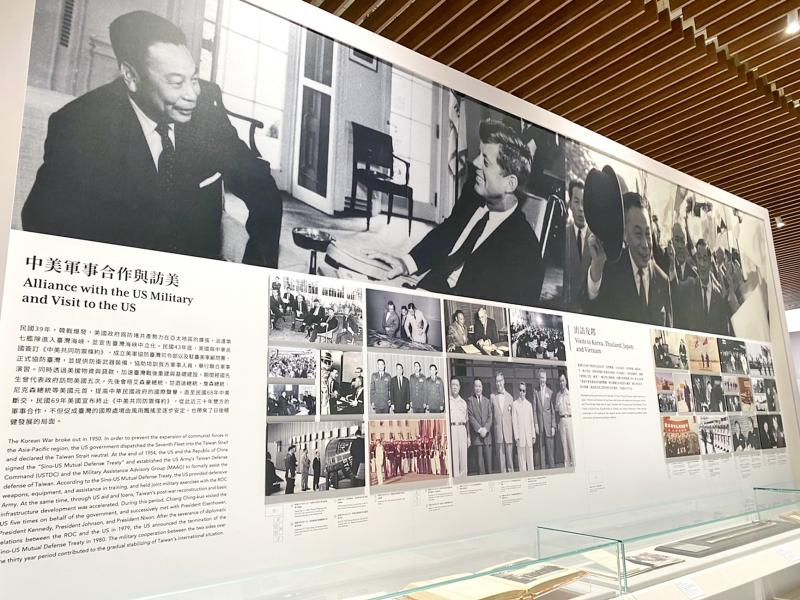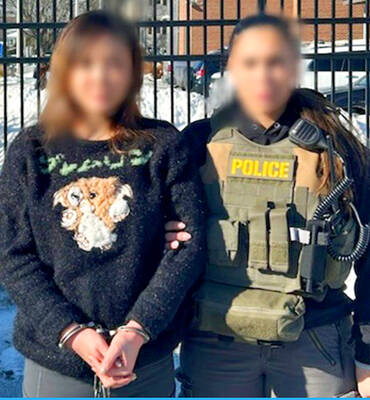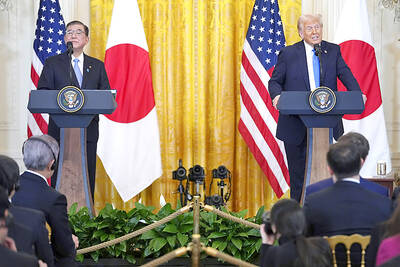A database of 55,000 documents related to former president Chiang Ching-kuo (蔣經國) was placed online on Wednesday, providing the public with a more comprehensive picture of the nation’s history and development, Academia Historica said.
The database also provides information from an academic research perspective about a period that saw the loosening of the authoritarian regime under Chiang, Academia Historica said.
Chiang, the eldest son of Chiang Kai-shek (蔣介石), served as president from May 1978 to January 1988. He died on Jan. 13, 1988, at the age of 77.

Photo: Yang Hsin-hui, Taipei Times
In July 1987, Chiang Ching-kuo of the Chinese Nationalist Party (KMT) declared an end to martial law, which had lasted 38 years. That same year, he also eased cross-strait restrictions by allowing family visits to China.
Chen Yi-shen (陳儀深), president of Academia Historica, which manages the written works of presidents and vice presidents, said that the records include Chiang Ching-kuo’s proclamations, speeches, diaries and political reports.
The database includes comprehensive records on Chiang Ching-kuo, including his handwritten notes and biographies on him, Chen said.
The database covers Chiang Ching-kuo’s early life and career, national politics, military and foreign affairs, and social and economic development, Academia Historica said.
The public could follow Chiang Ching-kuo on his frequent inspections of outlying islands and related activities, providing further information about national development, it said.
The database has been completed because sufficient information was collected on Chiang Ching-kuo and the period saw the gradual loosening of authoritarian controls, Chen said.
A database would next be created on former president Lee Teng-hui (李登輝), also of the KMT, who was in office from 1988 to 2000 and transformed Taiwan into a full democracy, he said.
Lee’s efforts have been called the “quiet revolution” that laid the foundation for a peaceful transition from a dictatorship to democracy. Dubbed “Mr Democracy,” Lee died on July 30, 2020, at the age of 97.
Although Lee did not leave many diaries, the Lee Teng-hui Foundation has many historical records, so Academia Historica aims to complete the database in one to two years, Chen said.
Taiwan hopes to build a database for each president or a library that covers the writings of all of Taiwan’s presidents in a bid to advance academic research, Chen added.
Ching-kuo Chi-hai Cultural Park (經國七海文化園區) in Taipei’s Dazhi (大直) area — which features Chiang Ching-kuo’s collections, diaries and paintings, among other items — is to be opened to the public from tomorrow, the Chiang Chiang-kuo Foundation for International Scholarly Exchange said.
The park includes Chiang Ching-kuo’s former home — known as the Seven Seas Residence (七海寓所) — a library and a tourist center.

Johanne Liou (劉喬安), a Taiwanese woman who shot to unwanted fame during the Sunflower movement protests in 2014, was arrested in Boston last month amid US President Donald Trump’s crackdown on illegal immigrants, the Criminal Investigation Bureau (CIB) said yesterday. The arrest of Liou was first made public on the official Web site of US Immigration and Customs Enforcement (ICE) on Tuesday. ICE said Liou was apprehended for overstaying her visa. The Boston Field Office’s Enforcement and Removal Operations (ERO) had arrested Liou, a “fugitive, criminal alien wanted for embezzlement, fraud and drug crimes in Taiwan,” ICE said. Liou was taken into custody

The US-Japan joint statement released on Friday not mentioning the “one China” policy might be a sign that US President Donald Trump intends to decouple US-China relations from Taiwan, a Taiwanese academic said. Following Trump’s meeting with Japanese Prime Minister Shigeru Ishiba on Friday, the US and Japan issued a joint statement where they reaffirmed the importance of peace and stability in the Taiwan Strait and support for Taiwan’s meaningful participation in international organizations. Trump has not personally brought up the “one China” policy in more than a year, National Taiwan University Department of Political Science Associate Professor Chen Shih-min (陳世民)

‘NEVER!’ Taiwan FactCheck Center said it had only received donations from the Open Society Foundations, which supports nonprofits that promote democratic values Taiwan FactCheck Center (TFC) has never received any donation from the US Agency for International Development (USAID), a cofounder of the organization wrote on his Facebook page on Sunday. The Taipei-based organization was established in 2018 by Taiwan Media Watch Foundation and the Association of Quality Journalism to monitor and verify news and information accuracy. It was officially registered as a foundation in 2021. National Chung Cheng University communications professor Lo Shih-hung (羅世宏), a cofounder and chairman of TFC, was responding to online rumors that the TFC receives funding from the US government’s humanitarian assistance agency via the Open Society Foundations (OSF),

ANNUAL LIGHT SHOW: The lanterns are exhibited near Taoyuan’s high-speed rail station and around the Taoyuan Sports Park Station of the airport MRT line More than 400 lanterns are to be on display at the annual Taiwan Lantern Festival, which officially starts in Taoyuan today. The city is hosting the festival for the second time — the first time was in 2016. The Tourism Administration held a rehearsal of the festival last night. Chunghwa Telecom donated the main lantern of the festival to the Taoyuan City Government. The lanterns are exhibited in two main areas: near the high-speed rail (HSR) station in Taoyuan, which is at the A18 station of the Taoyuan Airport MRT, and around the Taoyuan Sports Park Station of the MRT